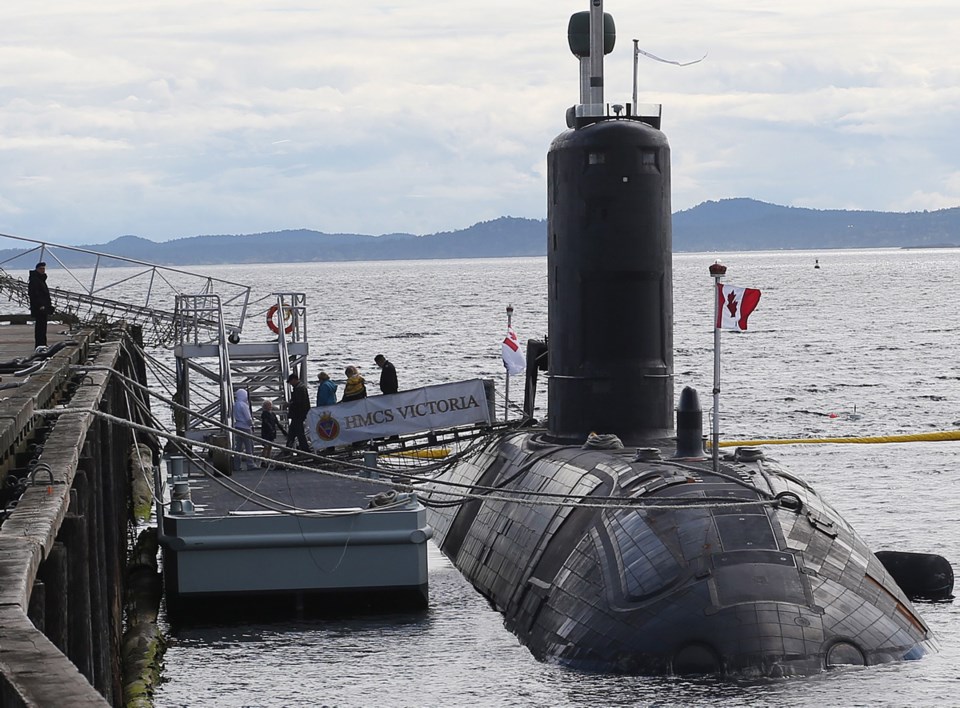This diesel-electric hybrid doesn’t have a lot of head room and it’s not easy to park. Maintenance is frightfully complex and spare parts are hard to come by.
But it normally sleeps 48 and can go for eight weeks without refueling.
HMCS Victoria is docked at the Canadian Coast Guard station for the weekend, and for the first time, Victorians can have a look inside their city’s namesake submarine.
Interest in the vessel was readily apparent Saturday as people started lining up at 8 a.m., two hours before public tours started.
The tours continue today and Monday from 10 a.m. to noon, and from 1 p.m. to 4 p.m.
The Victoria and its sister vessels — the Chicoutimi, the Corner Brook and the Windsor — have been the focus of constant controversy since their purchase from the British navy for $750 million in 1998. The Canadian navy has put considerably more than that into repairs and refitting.
After a tour of the Victoria, it’s easy to see why you can’t just pull a submarine into the garage for a quick oil change and a brake job. The sub’s interior is a dizzying maze of instrumentation, gauges, switches, pipes and other gear. Space is at a premium — the crew’s bunks are stacked three high, and sitting up suddenly in bed is not advised. Other bunks were made up alongside the torpedo racks for an additional 10 trainees.
I had seen the Victoria a few times from Fort Rodd Hill when the sub was docked at CFB Esquimalt, and in my mind, I had equated the vessel with the artillery batteries at the national historic site. Like the guns placed to defend the harbour, I assumed, the Victoria and the other submarines exist in case something bad happens.
But the Victoria’s captain, Cmdr. Chris Ellis, says the sub keeps busy with a wide variety of tasks. The Victoria was declared fully operational in 2012, and since then has been involved in international exercises and training, as well as the patrolling it was designed for.
Think submarine, and you probably think torpedoes. Sure, the Victoria has six torpedo tubes and can carry up to 18 Mark 48 torpedoes, but using those torpedoes isn’t the sub’s primary purpose.
“I hope we never have to use the Mark 48s,” said Ellis.
The Victoria’s strengths are stealth and endurance, he said. It can operate independently of the fleet for 40 to 60 days and can get close to other ships without being detected. It carries an array of sonar and electronic equipment to track marine traffic.
It’s as much an intelligence-gathering tool as it is a weapon.
“We live in a global society,” Ellis said. “We rely on the open sea and the movement of goods. Ninety per cent of the world’s goods move by sea.”
Submarines play a role in keeping those goods moving safely. For instance, Dutch subs submerged off the coast of Somalia monitor maritime traffic, particularly the activities of pirates. This allows navies and coast guards to reduce piracy on the open seas.
Canada’s submarines have helped, and continue to help, in the war on illegal narcotics.
“There’s a huge international effort in the Atlantic and Pacific to stem the flow of narcotics out of South America,” Ellis said. “Some cartels are looking at submersibles.”
Submarines are also a tool in controlling smuggling — humans and goods — and illegal fishing.
He compared a submarine to closed-circuit TV — you never know when you’re being watched.
And don’t wait for that telltale “ping, ping” to reveal the sub’s location — the Victoria uses passive sonar, which doesn’t transmit. Rather, it listens for and analyzes sounds through a variety of instruments.
As I climbed out of the submarine, sitting low and black in the water at the Coast Guard station, I couldn’t help but think of the stark contrast between the Victoria and the massive Grand Princess cruise ship docked nearby at Ogden Point. I almost laughed at the comparison between the luxury of a floating hotel and the spartan accommodations for the Victoria’s crew.
If I were taking a sea voyage, I admit I would prefer a cruise ship to a submarine, but it’s vessels such as the Victoria that allow ships like the Grand Princess to party their way along the coast.



